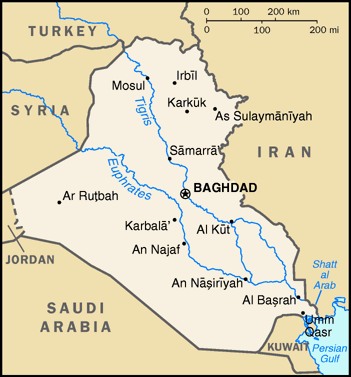Iraqi leaders from across the political spectrum are accusing Prime Minister Nouri al-Maliki of seeking to rig the country’s electoral system after he arrested the official in charge of administering elections.
 Maliki, increasingly denounced by Iraqi voices of all stripes as a ruthless dictator, seems to have taken to arresting anybody he disagrees with, including his own vice president, Tariq al-Hashemi.
Maliki, increasingly denounced by Iraqi voices of all stripes as a ruthless dictator, seems to have taken to arresting anybody he disagrees with, including his own vice president, Tariq al-Hashemi.
Now, the top elections official, Faraj al-Haidari, and another election commissioner, Kareem al-Tamimi, are jailed inside the Salhayah police station in Baghdad on charges of corruption, despite a court ruling in their favor two months ago.
The arrest of Haidari “is undemocratic and illegal,” said Muaid al-Tayab, a member of parliament. “We call it political revenge.”
Maliki had previously clashed with Haidari after the 2010 elections resulted in the prime minister’s party losing out to the Iraqiya bloc, a clash that led to months of impasse as Maliki contested the initial outcome. As the head of the Independent High Electoral Commission (IHEC), Haidari rejected Maliki’s petition to have thousands of votes for Iraqiya thrown out.
Maliki now seems to be teaching Haidari a lesson: never oversee an election that provides Maliki with less votes than others.
“The person who gave the specific order for this arrest, he is brother Nouri al-Maliki,” said a written statement issued by the cleric Moqtada al-Sadr. “This arrest should be done under the law, not under dictatorship.”
Khaled al-Alwani, a senior member of parliament in the Iraqiya bloc, accused Maliki and his backers of trying to target and marginalize his political opponents, and secure an unrivaled dictatorship. “They will push out Haidari by any means necessary,” Alwani said.
The Obama administration has kept largely quiet about Maliki’s behavior, aside from about $2 billion in annual aid and tens of billions in military assistance to support this drive to authoritarianism. While this keeps the halls of power in Washington and the oil corporations happy, even the best case scenarios are damning for Iraqi citizens as well as the geopolitics of the region.
“Maliki is heading towards an incredibly destructive dictatorship, and it looks to me as though the Obama administration is waving him across the finishing line,” said Toby Dodge, an Iraq expert at the London School of Economics. “Meanwhile, the most likely outcomes, which are either dictatorship or civil war, would be catastrophic because Iraq sits between Iran and Syria.”


